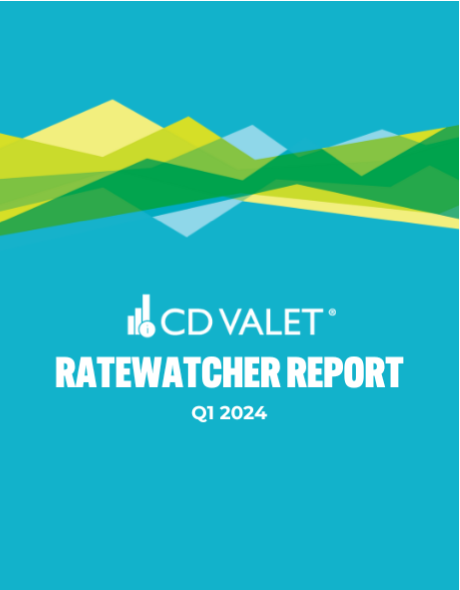When do we not think about taxes? We certainly think about taxes when we consider how we invest our money. And taxes are also top-of-mind at the end of the calendar year.
Certificates of Deposit (CDs) have gained popularity this year, given their low risk and high return relative to other options. But as you enjoy higher earnings on your CDs in this interest-rate environment there is one thing you may have missed: taxes.
To prepare what you can expect of your CDs when filing taxes, here is what you should know:
Is CD Interest Taxable?
All types of income you earn in a taxable year must be reported to the IRS. That includes the interest on your CDs. Keep in mind, as you earn interest on your CD even before it is fully matured, it is still considered taxable income and subject to the annual federal income tax.
When are taxes due on a CD?
Depending on if the CD is a short-term or long-term CD, the due dates are as follows:
- Short-Term: Interest earned on CDs with terms of one year or less is considered taxable income in the year that the CD interest is paid out.
- Long-Term: CDs with terms over a year are taxed as interest is earned over the CD term. Interest is considered taxable income in the year that you are legally entitled to it. For example, if you have a CD with a term of five years, you will owe tax on the interest paid in each of the years that you held the CD before maturity.
How Are CDs Taxed?
CD interest falls in the category of taxable income (salary, wages, tips, severance pay, overtime, bonuses, unemployment, etc.) and is taxed at the same rate. You can calculate the amount you owe on your CD interest based on your tax bracket and the dollar amount you gained in CD interest.
However, you do not have to claim interest that is accruing but not yet paid to you or to the CD. If interest compounds daily – interest earned on what you have deposited along with the additional interest you earn on the interest that is reinvested – but pays to the CD every quarter on the anniversary date of opening, then the CD could have interest that is accrued at year-end but has not been paid to the CD yet.
For example, if a CD is opened on August 5, 2023, interest would be paid on November 5, 2023. The interest that is accruing from November 6, 2023, through year-end is not reportable for the tax year of 2023 as it has not been paid to the account yet.
Many banks pay interest monthly or quarterly on the calendar month, so it is important you clarify with your financial institution when they pay interest on your account.
Do I report my principal and interest when I cash out my CD?
Only interest you earn on your principal amount is taxed. Financial institutions will report the interest you earned to the IRS and will provide you with a Form 1099-INT where you will need to claim the amount you earned as interest. You are not responsible for paying taxes at the time you “cash out” but are responsible for paying the taxes in the year that the interest was paid to you. For example, if your CD has a principal balance of $20,000 and you earned $500 in total interest for the entire CD term at the time you cash out the CD, you will only be taxed for interest that was paid to you in the current calendar year.
How to Report CD Interest on Your Tax Return?
When you’ve earned at least $10 in CD interest for the year, banks are required by law to report this information to the IRS and will provide you with Form 1099-INT by January 31 for your tax records. If you have multiple CD accounts, you will receive a copy of Form 1099-INT for each account. When filing your tax return, report this interest on Form 1040 Line 2.
What if I pay an early withdrawal penalty? How does this affect the taxes I pay on my CD interest?
Your bank will charge you an early withdrawal penalty fee when you withdraw funds from your CD before it reaches the maturity date – the end of its term. Typically, you are only charged the early withdrawal penalty on the funds withdrawn, not on the full CD amount. If you do incur an early withdrawal penalty, you can deduct the amount of your early withdrawal fee on your tax return, which will offset how much you pay in taxes on the interest you earned on your CD.
For example, if you earned $100 in interest, you would pay taxes on that $100. But if you pay an early withdrawal penalty of $20, you can deduct that from the interest you earned, leaving you to pay tax on $80 of income.
But There Are Exceptions to When You Pay Taxes on CD Interest…
You can defer paying taxes on your CD interest in a couple of ways. When a CD is placed in tax-advantaged accounts such as a tax-deferred IRA and 401(k), you are not taxed on your interest until you withdraw your total earnings, typically around retirement. On a Roth IRA CD, the interest is tax-free if you hold the IRA for 5 years and are 59.5 years old or older. With a traditional IRA CD, the interest does not have to be claimed until you withdraw the funds after age 59.5 years old or older. You typically are in a lower tax bracket, and you may get the extra benefit of being able to deduct the contribution too.
Another option is opening a short-term CD. This provides the option to defer taxes from one year to the next. According to Time, “By investing in a short-term CD in one year with a maturity date in early January of the next year—i.e., before the January 15 due date for the final estimated tax payment for the prior year—a taxpayer can enjoy both a better interest rate and one-year tax deferral on the CD interest.”
Note: If you exercise any of these options it is important to remember that your annual contribution to retirement accounts remains below the contribution limits set by the IRS. For 2023, the IRA contribution limit is $6,500; if you are age 50 or older, the limit is $7,500.
How can I use CDs to prepare for paying my taxes?
One common use for a CD is saving for near-term planned expenses, like tax payments or tuition. This makes CDs often a highly effective way of managing funds that you do not expect to need for a matter of months or years, but you do not want to place yourself at risk of losing your principal by investing in stocks or other assets that are subject to price volatility. And for an extra layer of security, CDs are protected – up to a minimum of $250,000 per depositor – under insurance provided by FDIC or NCUA.
Final Takeaway
Rising interest rates this year have made CDs an increasingly popular savings strategy. Before you open your next CD, consider the earnings you will make and when you will be expected to pay federal income taxes on them. This may influence the maturity you select.
Disclaimer: This is not intended as tax or legal advice. Please consult your tax advisor or financial planner to understand how these topics may affect your individual financial situation.












